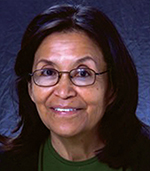 Why did you choose your specific health professional career?
Why did you choose your specific health professional career?
When I was in high school, students were asked to participate in career-day activities. I thought about the conditions on my reservation and knew of the great need in my own community. My family and other Navajos living in my community were poor. I wished that the conditions (impassible roads; inadequate housing; access to medical facilities, care, water and electricity availability; and other health disparities) were better. With this in mind, I thought about a career in the health care field that would provide me with a way to help American Indian people.
What experiences did you have to make sure this profession was right for you?
When I graduated from high school, I had a summer job as a nurse’s aide/translator working in a private non-profit hospital in southern Utah. This job gave me an opportunity to work in a hospital setting, which gave me hands-on experience working with the medical staff and clients. After one year of nursing practice in a southern California university hospital intensive care unit, I traveled to the Philippines as a volunteer to assist two graduate students as they completed a public health field project. On my first day there, after settling into a hut in a small coastal village, I saw tetanus in a newborn. This inspired me to develop a plan to educate and train several community midwives on how to improve sanitation techniques during and after delivery of an infant. This work experience in a community setting gave me the opportunity to observe first-hand the importance of public health. I decided to return to the United States and complete a degree in nutrition science with a master’s in public health.
Describe any obstacles or barriers to success that you encountered along your health professional career path. How did you overcome them?
When I lived on my reservation as a child, I was not encouraged or given an opportunity to plan ahead. My parents and grandparents planned for the family garden, harvest, and spring sheep shearing. In college, my science professor asked me to develop a professional plan. I did not know how to develop a simple plan. Practice in developing these professional plans helped me improve my skills at writing goals, developing and implementing the plans, and setting priorities. My family spoke in our native language at home. English is my second language. Learning to speak and write in English was difficult for me. When I started school, I was embarrassed about not pronouncing English words correctly and having a heavy Navajo accent. In addition, the schools I attended did not address my need to improve my reading and writing skills. When I attended college the first time, I had great difficulty. I took remedial and intermediate level writing classes in college, wrote daily journals, and read interesting books/journals. I also had tutors for certain classes and joined study groups for most science classes.
What do you do in your current job?
I work for the federal government. This branch works to develop partnerships to effectively address public health issues, including epidemiology, behavioral research, surveillance, development of interventions, health promotion, policy and environmental change, communication and social marketing. I am a member of this team that focuses on the public health of the American Indian/Alaska Native population.
What advice do you have for American Indian/Alaska Native students who are interested in health careers?
One bit of important advice is your approach to improving your professional development and skills. This requires you to start a routine self-assessment, peer evaluation, and supervisor, professor, and teacher evaluation. Self-assessment guides you in developing a plan to improve areas of weakness. Your plan should continue to evolve as you grow. It is never too early or too late to start self-assessing as this gives you the substance needed to develop plans for improvement. It has been helpful for me to discover and realize that learning will continue throughout my life.
What would you like to see for your tribe’s future?
My hope is to see the Navajo tribal government and/or leaders become engaged in running the day-to-day business operations of the health care industry. Once the tribal leaders learn the public health principles and philosophy, the tribal leaders will be in a position to know best how to effectively address the public health issues of the people living on the Navajo reservation.
Do you practice traditional medicine? If you do, then how does traditional medicine interact with conventional medicine?
No, I do not practice traditional medicine; however, I use tea found on the Navajo reservation and certain types of traditional food additives in preparing traditional foods. In the Navajo culture, the traditional healing practices involve the participation of the entire family and community. There is much that can be said about healing through a supportive environment. Traditional medicines have their important place as well as conventional medicine.

